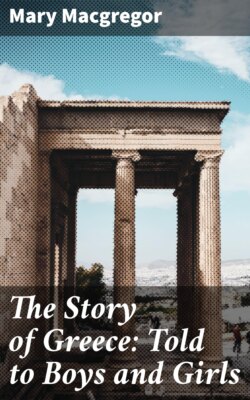Читать книгу The Story of Greece: Told to Boys and Girls - MacGregor Mary Esther Miller - Страница 25
На сайте Литреса книга снята с продажи.
CHAPTER XXII
LYCURGUS AND HIS LITTLE NEPHEW
ОглавлениеTable of Contents
The Dorians were a brave and sturdy race, braver, perhaps, than any other of the Greek tribes. Apollo, the Sun-God, one of the noblest of the Olympians, was the god they held in greatest reverence.
A band of these Dorians came from the north and settled in the valley of Laconia, through which flows the river Eurotas. Here they built villages and called themselves Lacedaemonians.
Before long five of these villages joined together to form a city, which was named Sparta. Sparta became the capital or chief city in Laconia.
At first the new city was weak, scarcely able to hold her own against the neighbouring tribes, and much less able to add to her dominion. She was indeed hardly able to keep order within her own borders.
Sparta was ruled not by one king but by two, and so you might perhaps think that she would be governed better than any other city or state, but this was not so.
The first kings were twin brothers, for an oracle had bidden the Spartans ‘to take both as kings, but to give greater honour to the elder.’
Instead of helping each other to improve their country, the two kings often disagreed, and then spent their days in quarrelling. The people were content that they should do so, for while the kings quarrelled they had no time to frame stricter laws or to punish those who disturbed the peace of the city.
It soon became clear that if Sparta was to grow great and prosperous a strong man must be found to guide the kings as well as the people. This strong man was found in Lycurgus the famous lawgiver.
History tells little about the life of the lawgiver, but many legends cluster around his name. It is told that Lycurgus belonged to one of the royal houses, and that when his elder brother died he became for a short time one of the kings of Sparta.
The queen-mother was an ambitious woman, and she wished still to sit on the throne as she had done while her husband was alive. So she said to Lycurgus that she would kill her tiny baby boy who would one day be king, if he would marry her. But the lawgiver was angry, and rebuked the queen-mother for wishing to do such a wicked deed.
One night as he sat at supper with the chief men of Sparta, Lycurgus ordered his little nephew to be brought to him.
When the child was carried into the room he took him in his arms and holding him up for all to see, he cried, ‘Men of Sparta, here is a king born unto us.’ Before them all he placed the babe on the throne, and as the child had not yet been named, he called him Charilaus, the joy of the people.
From that time Lycurgus became the guardian of his little nephew and the regent of the kingdom. So upright were his ways, so honest his words, that he was reverenced by the people as greatly as when he was king.
Meanwhile the queen-mother had not forgiven Lycurgus for thwarting her ambition, and she determined to punish him. So she spread a report among the people that Lycurgus meant to put his nephew to death that he might again become king.
Before long the rumour spread by the queen-mother reached the ears of Lycurgus, and he at once made up his mind to leave Sparta until Charilaus was old enough to reign. As he journeyed from place to place Lycurgus studied the laws and manners of the different countries, so that when he returned to Sparta he might be able to improve the laws of his own land.
At Ionia he is said not only to have read the works of Homer, but to have met the poet himself. So wise were many of the customs described in the poet’s books that he set to work to reframe those that he thought would be of most use in his own country.
Some stories tell that Lycurgus made a copy of part of the poet’s works, for it is thought that the Greeks at this time (about 800 or 900 B.C.) already knew how to write. It was thus Lycurgus who made the works of Homer well known to his countrymen.
But in all his travels what interested Lycurgus most was the way the soldiers were trained in Egypt. In other countries he had seen men who ploughed their fields or plied their trade, leave their work to fight when war broke out, but the Egyptian soldiers were soldiers and nothing else all the year round.
Lycurgus determined that he would train the youths of Sparta as strictly as the soldiers in Egypt were trained. They should be neither ploughmen nor merchants, but the best soldiers the world had ever seen.
